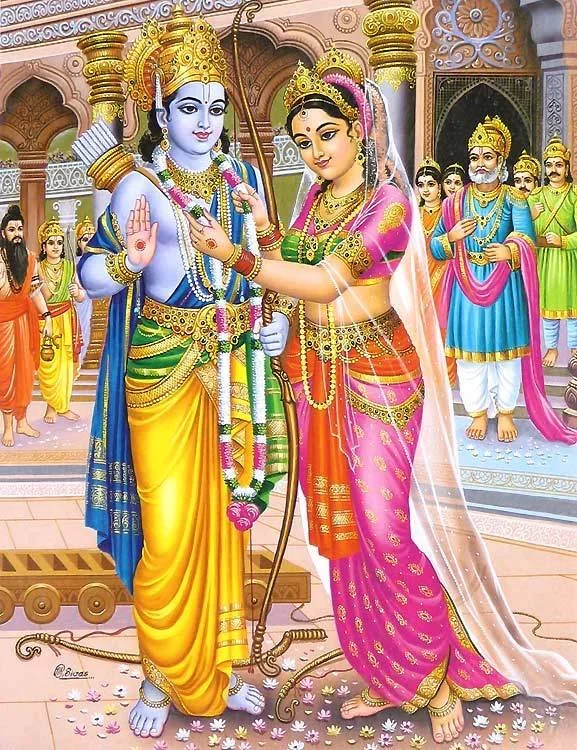Sita is the name in India for everything that is good, pure and holy; everything that in women we call women. The women in India must grow and develop in the foot prints of Sita, that is the only way.
--Swami Vivekananda
Ahalya, Draupadi, Sita, Tara ,Manodari thatha
Pancha kanya smaren nithyam sarva papa vinashanam
_Prathasmaranam
(All the sins of those who think about the five great women Ahalya, Draupadi, Sita, Tara and Mandodari will be destroyed).
The very thought of Sita Devi, wife of the epic hero Sri Rama purifies a person. No woman can come even closer to Sita in greatness. We read about the great qualities of Sita Devi in the words of Valmiki in Ramayana. No good women would have undergone so many problems. In spite of her miserable life, she never lost her balance. She held her husband Rama in high esteem till the last minute.
Sita’s death is miserable and mysterious. Miserable in the sense, she had a tragic end. But she herself chose it. She asked Mother Earth to take her back where from she came. If we read, between the lines, we may see that Sita Devi died in an earth quake. The Ramayana sloka clearly speaks of big tremors through the ‘world’ when she went down the earth. The wonder of wonders is that she knew that there is going to be an earth quake. Hindu scriptures say that chaste women can control five elements- any aspects of nature. Earlier also she did fire walking at the command of her husband and came pure when a washer man suspected her chastity.
Sita was born and brought up in an earth quake prone area comprising modern Bihar bordering Nepal. Bihar was notorious for biggest earth quakes of India. Valmiki described her descent in to earth as a miracle. He said in the Ramayana that a marvellous throne supported on the heads of Nagas came from down the earth and when Sita took the seat it went down when the entire world was watching. At that moment a great tremor passed through the whole world, he added.
Modern science shows that animals can sense earth quakes several days before it actually happens. No wonder Sita came to know about it days before it happened and prepared herself . Valmiki who stood by her side though out her trials and tribulations was a Trikala Jnani. He can foretell anything. Hindus go beyond Einstein in understanding and explaining Time. They see it from the top of a mountain as a running stream of past, present and future. They can see all the three stages at the same time like we see the buses moving along the roads far down below a hill.
We also witnessed a sad earth quake event in our own life time. On 26[SUP]th[/SUP] January 2001, the Republic Day of India, there was a big earth quake in Gujarat which killed thousands of people. Students who were attending the Republic Day parade went down the earth and disappeared while people were watching the parade. Though it is rare, it could happen. We may believe that something like it happened on the last day of Sita’s life.
Bible narrated seven catastrophes happening on seven days during Moses’ struggle against the Pharaoh. Modern research shows that it did not happen on consecutive days ,but over a considerable time. Passage of time and myth making make strange stories (Please read my article Did Agastya drink the ocean in Is Brahmastra a Nuclear Weapon? ).
RAVANA TRAPPED
There is an anecdote about Ravana in our epics and mythologies. That also happened during an earth quake in the Himalayas. Ravana was ‘punished ‘ by Lord Siva for his arrogance. The Saivite saints sang about it in every Pathikam (Ten Hymns) in Thevaram. The legend is that Ravana tried to lift the Kailash hills, the abode of Shiva, and Siva pressed it down and Ravana’s hands got crushed. Then Ravana fled the area. Gnana Sambandhar made it a point to refer to this anecdote in every ninth hymn in his Thevaram.
It looks like there was an earthquake when Ravana visited the Himalayas and got trapped there. After his prayers to Shiva everything went alright, but his arrogance was subdued. This gave place for this episode of Ravana getting crushed under Kailash.
There are lots of references in Sangam Literature and Sanskrit literature about earth quakes. The translation of the Tamil word Nilam Putai Peyarthal (Purananuru 34 by Alathur Kizar) is land moving or dislocating. They knew very well about such earth quakes.

